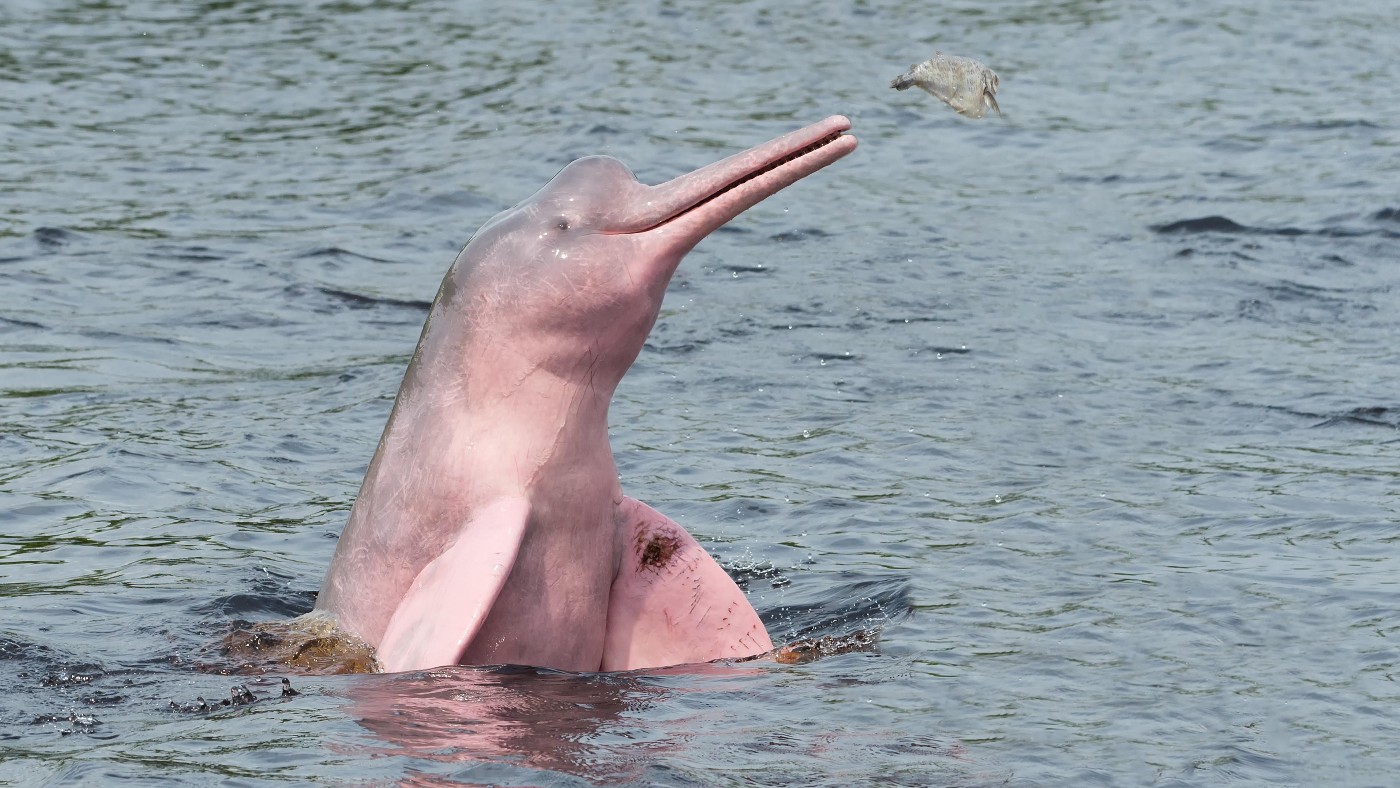The drying Amazon rainforest: a drought that affects the world
The Amazon is suffering a drought of historic severity and it’s pushing its inhabitants to their limit

A free daily email with the biggest news stories of the day – and the best features from TheWeek.com
You are now subscribed
Your newsletter sign-up was successful
Few things speak so eloquently of the plight of the world’s biggest freshwater basin than the decaying carcasses of the Amazon’s pink river dolphins, says Um só Planeta (Rio de Janeiro).
Since mid-September, 130 of these beautiful, endangered creatures have washed up on riverbanks in and around Lake Tefé, which lies at the heart of Brazil’s Amazonas state. Much of the water has dried up – in September the Amazon fell 30cm a day over a period of two weeks – and such water as does remain is too hot for most dolphins, and for the thousands of fish, to survive in.
No fish to catch, no water to drink
The Amazon is suffering a drought of historic severity and it’s pushing its inhabitants to their limit, said Joan Royo Gual in El País (Madrid). The rivers of Brazil’s north are its highways, but now many are too shallow for canoes to navigate. So hundreds and thousands of people in jungle villages are stranded. There are no fish to catch. There’s little drinking water. And the giant hydroelectric plant on the Madeira River has had to shut its turbines.
The Week
Escape your echo chamber. Get the facts behind the news, plus analysis from multiple perspectives.

Sign up for The Week's Free Newsletters
From our morning news briefing to a weekly Good News Newsletter, get the best of The Week delivered directly to your inbox.
From our morning news briefing to a weekly Good News Newsletter, get the best of The Week delivered directly to your inbox.
The rest of Brazil is affected too, because Manaus, capital of Amazonas, is the industrial hub where many of Brazil’s TVs, dishwashers and air-con units are made. “All that merchandise leaves the city in trucks aboard rafts”– but maybe not for much longer. The weather system known as El Niño – an abnormal warming of surface waters in the Pacific – intermittently causes droughts in the Amazon region, said Wérica Lima in Amazônia Real (Rio de Janeiro), but its effects have been exacerbated this year by the simultaneous warming of waters in the North Atlantic brought on by climate change. Together, these systems have so inhibited the formation of clouds that rainfall in one city fell to a quarter of its normal September levels. And polluting smoke from the resulting forest fires has further inhibited rainfall.
Deforestation devastation
It’s not just down to the weather, said Lucas Ferrante on The Conversation. Deforestation is also a key part of the problem. With the land drier than ever, deforesters find it easy to burn vegetation and open up the land for soya or cattle pasture. And the building of the BR-319 highway, which is slicing through one of the most conserved blocks of forest and bringing deforesters with it, is making things worse.
Deforestation makes it ever harder for the rainforest to recover from droughts, said Alind Chauhan in The Indian Express (Delhi), and that ability to recover, as a study in Nature has shown, may have reached a tipping point. If it does tip, the lush green forest would turn into drier open savannah, release vast amounts of stored carbon, and accelerate global warming. That’s why the need to halt the deforestation is so vital. The Amazon may seem a distant world, but every corner of Earth is affected by its fate.
A free daily email with the biggest news stories of the day – and the best features from TheWeek.com
-
 What are the best investments for beginners?
What are the best investments for beginners?The Explainer Stocks and ETFs and bonds, oh my
-
 What to know before filing your own taxes for the first time
What to know before filing your own taxes for the first timethe explainer Tackle this financial milestone with confidence
-
 The biggest box office flops of the 21st century
The biggest box office flops of the 21st centuryin depth Unnecessary remakes and turgid, expensive CGI-fests highlight this list of these most notorious box-office losers
-
 Why broken water companies are failing England and Wales
Why broken water companies are failing England and WalesExplainer With rising bills, deteriorating river health and a lack of investment, regulators face an uphill battle to stabilise the industry
-
 The plan to wall off the ‘Doomsday’ glacier
The plan to wall off the ‘Doomsday’ glacierUnder the Radar Massive barrier could ‘slow the rate of ice loss’ from Thwaites Glacier, whose total collapse would have devastating consequences
-
 Can the UK take any more rain?
Can the UK take any more rain?Today’s Big Question An Atlantic jet stream is ‘stuck’ over British skies, leading to ‘biblical’ downpours and more than 40 consecutive days of rain in some areas
-
 As temperatures rise, US incomes fall
As temperatures rise, US incomes fallUnder the radar Elevated temperatures are capable of affecting the entire economy
-
 The world is entering an ‘era of water bankruptcy’
The world is entering an ‘era of water bankruptcy’The explainer Water might soon be more valuable than gold
-
 Climate change could lead to a reptile ‘sexpocalypse’
Climate change could lead to a reptile ‘sexpocalypse’Under the radar The gender gap has hit the animal kingdom
-
 Why scientists want to create self-fertilizing crops
Why scientists want to create self-fertilizing cropsUnder the radar Nutrients without the negatives
-
 The former largest iceberg is turning blue. It’s a bad sign.
The former largest iceberg is turning blue. It’s a bad sign.Under the radar It is quickly melting away